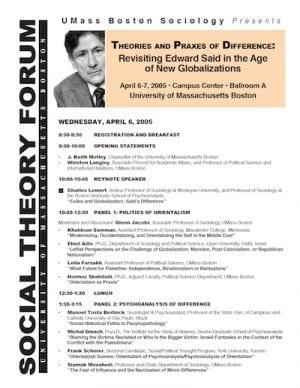Proceedings Journal Article — Blaming the Victims Revisited: Fantasy and Politics in the Context of Israeli-Palestinian Conflict — by Michal Ginach
$15.00
I revisit Edward Said’s writing with the idea that if we are to understand the reality of Palestinian victimization at the hands of Israel, which Said’s book seems to call for, it is not enough to talk in terms of injustice and blame. In Reflections On Exile, a book of collected essays published in 2003, paraphrasing Jacqueline Rose, Said emphasizes the need “to make connections” between the normally disparate realms of states and fantasy, “unavoidable for us all”(2003:498). It is upon this elusive connection between fantasy and politics that I elaborate in this paper.
Description
Abstract
Blame is an ominous word, pregnant with the weight of wrongs that can neither be forgiven nor forgotten. It is a word beyond which there is norelationship. Blame is the justification most Israelis, and some factions of the Palestinian people as well, use in order to maintain the status quo of war between them. When Edward Said titled his book Blaming The Victims (2001), he meant it literally. Seeing the Palestinians as the real victims, he protested against the world conspiring to blame them for the bloody impasse in the Middle East. I revisit his writing with the ideathat if we are to understand the reality of Palestinian victimization at the hands of Israel, which Said’s book seems to call for, it is not enough to talk in terms of injustice and blame. In Reflections On Exile, a book of collected essays published in 2003, paraphrasing Jacqueline Rose, Said emphasizes the need “to make connections” between the normally disparate realms of states and fantasy, “unavoidable for us all”(2003:498). It is upon this elusive connection between fantasy and politics that I elaborate in this paper.
Recommended Citation
Ginach, Michal. 2005. “Blaming the Victims Revisited: Fantasy and Politics in the Context of Israeli-Palestinian Conflict.” Pp. 85-94 in Theories and Praxes of Difference: Revisiting Edward Said in the Age of New Globalizations: Proceedings of the Second Annual Social Theory Forum, April 6-7, 2005 (Discourse of Sociological Practice, Vol. 7, Issues 1&2, Fall/Spring 2005). Double-Issue Guest Editor: Mohammad H. Tamdgidi. Sociology Department, UMass Boston.
Read the Above Publication Online
You can read the above publication free-access online, by clicking the PDF icon below.







